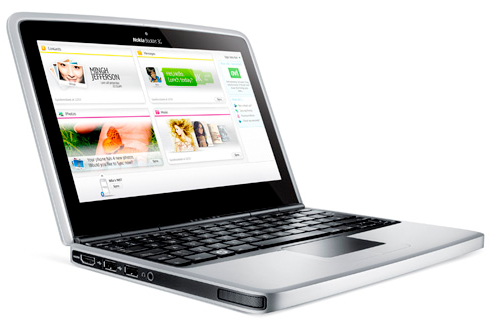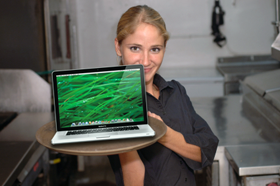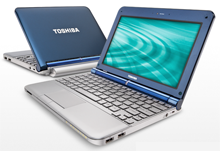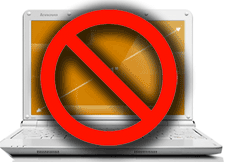Nokia, which has made some PC-like devices in its day, is finally making…a PC. The company has announced the Booklet 3G, a device that it’s calling a mini-laptop. I’m calling it a netbook, but a pretty fancy one: It’s got an aluminum case, built-in 3G (with swappable SIM card) and GPS, and HDMI output. Nokia claims twelve hours of battery life–even if you apply the usual discount and assume it’ll be more like eight hours in the real world, it would be impressive. It features Nokia’s Ovi services for synchronization with the company’s phones. It weighs 2.75 pounds and is “slightly more than two centimeters thin,” which would make it a bit under .8″. Oh, and the Booklet runs Windows–and Windows 7 at that.
Judging from the photos, the Booklet’s industrial design gives us a good idea of what an Apple netbook might look like if it was a MacBook Pro, only smaller:

Here’s Nokia’s promotional video:
I’m a sucker for the concept of deluxe netbooks, so I’m glad that the Booklet is joining HP’s Mini 5101 at the high end of the market. Nokia hasn’t announced a price, but if all the stuff it’s talking about comes standard, I wouldn’t be shocked if the system cost in the neighborhood of $800 or even a bit more, assuming it’s not subsidized by a wireless carrier. (Which, for netbooks, is a pretty darn exclusive neighborhood.) It also hasn’t said anything about availability yet–and it’s not a given that this beast will be widely available in the U.S., given the company’s relatively low profile in the states. It says it’ll have more to say about the Booklet at its Nokia World conference on September 2nd.

 I’ve drizzled various beverages into notebook keyboards. I’ve released laptops from my hands and watched as they’ve struck carpet, hardwood, and concrete. I’ve broken connectors with a definitive “snap.” I wish I could say it was part of some methodical lab testing, but I’ve done all of the above and more during the continuous tech stress test known as everyday living.
I’ve drizzled various beverages into notebook keyboards. I’ve released laptops from my hands and watched as they’ve struck carpet, hardwood, and concrete. I’ve broken connectors with a definitive “snap.” I wish I could say it was part of some methodical lab testing, but I’ve done all of the above and more during the continuous tech stress test known as everyday living. I swear I’m not a conspiracy theorist. But if I were, I’d be suspicious about the
I swear I’m not a conspiracy theorist. But if I were, I’d be suspicious about the  Earlier this week, I was
Earlier this week, I was  It’s always dangerous to assume that anything presented in a newspaper article as a social trend is, in fact, a social trend. But I’m still a bit stressed over a Wall Street Journal story that says that there’s a
It’s always dangerous to assume that anything presented in a newspaper article as a social trend is, in fact, a social trend. But I’m still a bit stressed over a Wall Street Journal story that says that there’s a When Toshiba
When Toshiba  The last major PC manufacturer who didn’t sell a netbook in the U.S. is jumping into the pool: Sony has announced that its VAIO W will arrive in August. The specs are standard stuff: a 1.6-GHz Atom processor, 1GB of RAM, a 10.1-inch screen, a 160GB hard drive, Bluetooth, Draft-N Wi-FI, Ethernet, two USB ports, a Webcam, and slots for SD and Memory Sticks. It runs Windows XP. And while the price is a tad on the high side at around $500, the screen resolution is, too: It’s a relatively roomy 1366 by 768. Oh, and the W is available in three colors: berry pink, sugar white, and cocoa brown.
The last major PC manufacturer who didn’t sell a netbook in the U.S. is jumping into the pool: Sony has announced that its VAIO W will arrive in August. The specs are standard stuff: a 1.6-GHz Atom processor, 1GB of RAM, a 10.1-inch screen, a 160GB hard drive, Bluetooth, Draft-N Wi-FI, Ethernet, two USB ports, a Webcam, and slots for SD and Memory Sticks. It runs Windows XP. And while the price is a tad on the high side at around $500, the screen resolution is, too: It’s a relatively roomy 1366 by 768. Oh, and the W is available in three colors: berry pink, sugar white, and cocoa brown. According to DigiTimes–a Taiwanese publication that’s always interesting, if not always completely reliable–Samsung is
According to DigiTimes–a Taiwanese publication that’s always interesting, if not always completely reliable–Samsung is  People are buying scads of the pint-sized laptops known as netbooks these days, but there’s
People are buying scads of the pint-sized laptops known as netbooks these days, but there’s